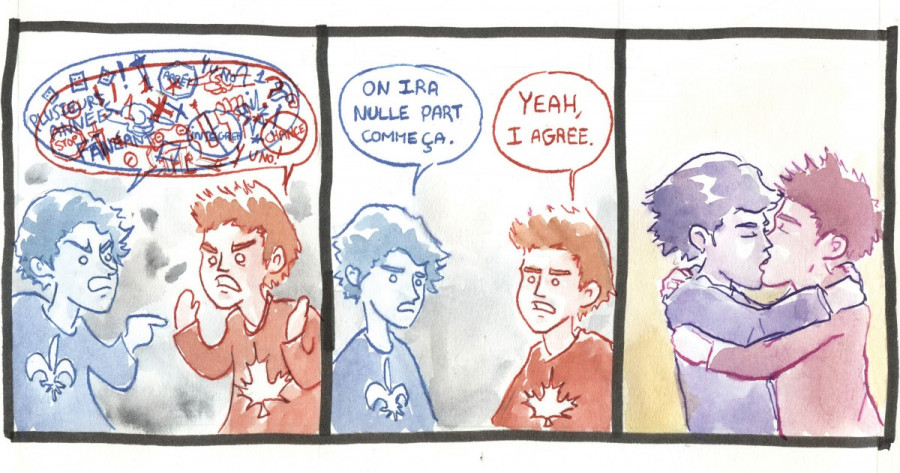French or Be Frenched
Discourse Surrounding Language Debate Needs to Change
Let me preface this article by explicitly stating that the only reason I moved to Montreal was to learn French.
If I were smart, I probably would have transplanted myself somewhere like Tadoussac where Anglos are like aliens, making up less than two per cent of the population.
In Montreal, however, Statistics Canada suggests that just over half of the 1.6 million people here are bilingual, and 18.5 per cent of us are Anglos.
But with two suitcases and a dream, I packed, got on a plane and enrolled in a class. I managed to charm a gang of French friends in the meantime, became known as “l’experiment du Winnipeg,” and I practiced.
Four years later, I honestly still struggle to integrate. It is difficult, of course, but not impossible. You just need to want it, and work towards it.
But the reality is that not everyone does, or can. Even when you’re trying hard, navigating budding bilingualism here can prove tricky. It requires a ton of effort, some luck, and you need to actively keep committed.
Even if you take a course, people are going to switch languages when they detect an accent. Get used to that—they’re probably doing it to be kind, but explain politely that you are learning and they’ll likely give you a chance.
That, or there’ll be some awkward silence. Sometimes people are condescending about it, but they are the exception, not the rule.
Moreover, when you are in the early stages of the learning process you have to be psychologically ready to a) not speak all that much and b) sound like a total idiot when you do. God help you if you can’t laugh at yourself.
My suggestion is to find patient French-speaking friends and lovers. This will help enormously.
The other thing about attempting French in Montreal is that you can get away with being lazy if you find it too difficult, have other things to do, or have no interest in learning. You can live in the McGill ghetto, the West Island or the Mile End and carry on with your life, school or personal projects.
Personally, I don’t judge. Live and let live.
But if you don’t bother or can’t seem to figure out French, you should know you are one of the 260,000-plus Montrealers making up a so-called unilingual anglophone “trend” and you are currently at the very centre of a so-called “cultural controversy.”
I’m not sure what happened in the news over the last few weeks (early warning shots of a provincial election, perhaps?), but someone has stirred the language pot.
After it was revealed in La Presse that a Vice President of the National Bank is a unilingual anglophone, talk show host Guy A. Lepage got into it, hinting at a boycott, on Radio Canada’s Tout le monde en parle.
Just prior, CBC’s Daybreak interviewed two anglo-only folks who have been here for decades, which garnered a huge reaction and set off L’actualité blogger Jean-François Lisée, and Le Devoir‘s Michel David.
“We can easily get frustrated about the unwillingness, the lack of intellectual curiosity—the arrogance—of people who’ve been living in Quebec for years without having made an effort to learn French,” David wrote in Le Devoir on Dec. 3. “Is that their fault, or ours?”
The Métropolitain managing editor Dan Delmar had a different take. Dubbing it “the unilingual anglophone witch-hunt,” Delmar called the issue manufactured, and took the commentators to task for perpetuating a linguistic crisis that he believes is intellectually dishonest.
“The story is that there is no story,” he wrote. “This isn’t a bilingual pissing contest.”
Either way, there’s seems to be no sign of this ‘us versus them’ discourse slowing. You get strong media personalities talking about the French/English “solitudes” and ugly insecurities on both sides seem to fly.
On one hand, I think I can understand where the francophones are coming from on this: culture, history and politics—especially in Quebec—are a battlefield. There is a lot of baggage there, and a lot to lose.
Hemmed in on all sides by a nearly homogenous, English-speaking North American culture that seems to be growing close to home, it’s understandable francophones are protective of their history and lifestyle. From this perspective, it clearly must be difficult to deal with selective appropriation.
Anglos on comment boards and social media, meanwhile, are using the old ‘xenophobe’ card to respond to the French outlook, which isn’t exactly constructive either.
From what I can tell, both ‘solitudes’ are essentially blaming each other for the same, blanket thing: perceived ignorance and a lack of accommodation.
However, I don’t believe that this discourse adequately represents, or serves, anyone.
Because of our diversity, this tension is pretty unique to Montreal and is important to negotiate if we are going to move forward.
But the culture of debate around the issues has become its own entity—and it’s pretty ugly and defensive.
Moreover, this two-sided dispute totally negates crucially important components and complexities that exist here.
Where do allophones fall in this equation and narrative? What about native language and culture, which is very seriously on the verge of extinction?
Listen, I’m not even trying to pretend that I have an answer to “the language issue” or claim to be expert on the cultural diaspora in Montreal, but there must be a better way of talking about language and framing the debate.
I highly doubt that the comparatively small population of unilingual anglophones in Montreal warrants an entire province getting into cultural-crisis mode, but it is worthy of conversation. The tone just needs to change.
Linguistic ability and language politics are incredibly personal and variant things. The individual exchanges you have with people—francophone, anglophone, allophone, alien—are going to be just as diverse.
If we get caught up in the recent rhetoric and play the blame game across the public forum, what’s the trickle down effect going to be when we speak eyeball-to-eyeball?
This is a multi-faceted issue that requires a bit more mutual respect from all sides.
Only when we have that will we actually be talking to each other—regardless of which language we’re using.






